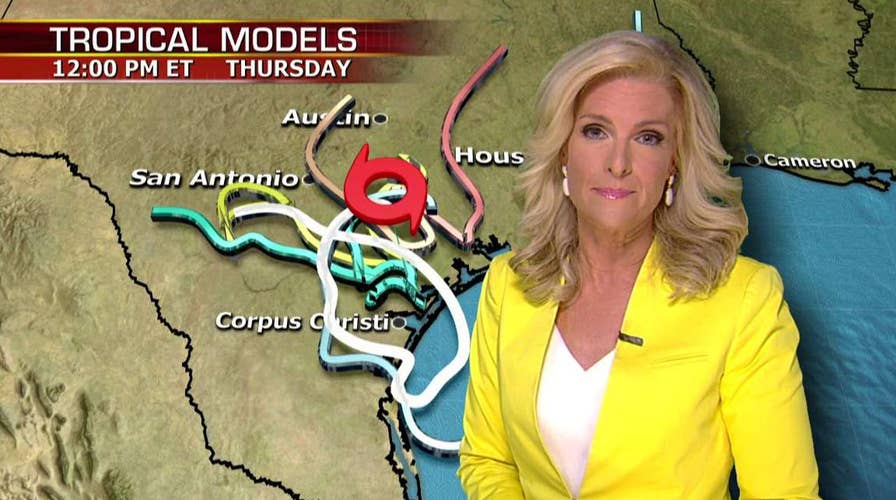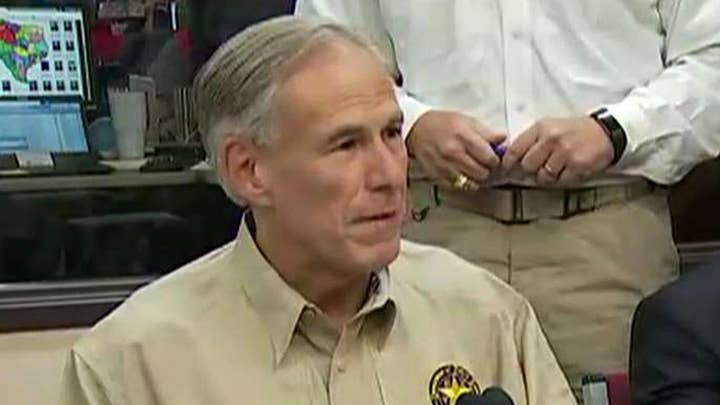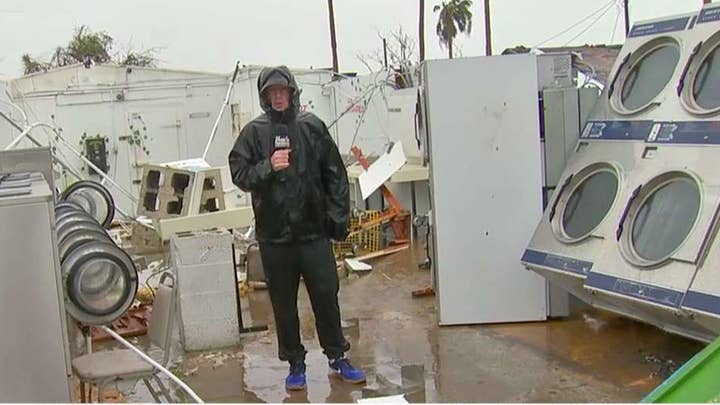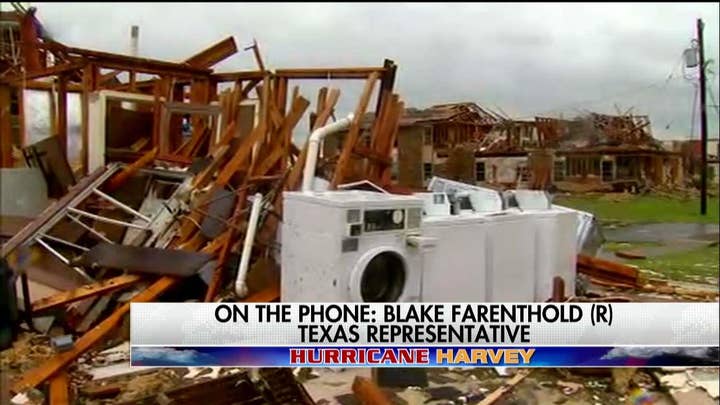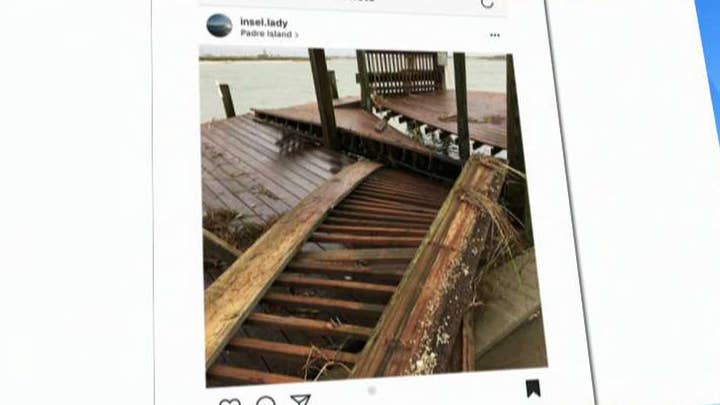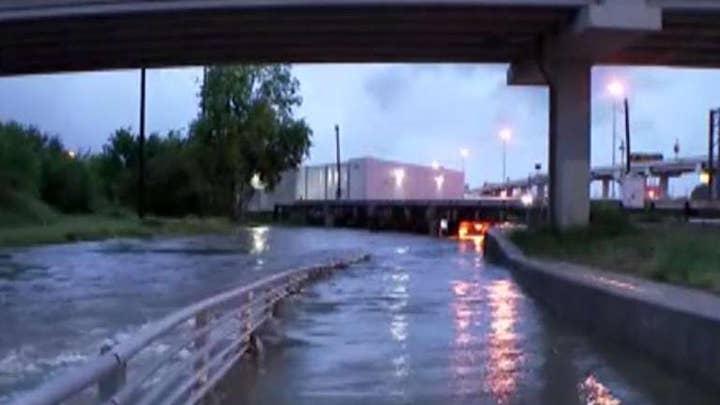A second death has been confirmed in Texas in connection with Hurricane Harvey.
The medical examiner's office in Harris County said one person had died in flooding. The fatality was an elderly woman who was killed as she drove through flooded streets on Houston's west side Saturday night, a Houston police officer said.
"It appeared that her vehicle went into high water and she drowned as a result,'' said Sgt. Colin Howard of the Houston police department. The victim was not immediately identified.
Previously, Rockport Mayor Charles Wax said one person had died there in a house fire as the hurricane came ashore Friday night. Aransas County Judge C.H. "Burt" Mills Jr. told the Austin American-Statesman that 12 to 14 other people were injured.
"It’s pretty sickening," Mills told the paper. "Lots of emotions are involved when you see your community destroyed like this, but we’ll bounce back."
Harvey came ashore as a Category 4 hurricane about 30 miles northeast of Corpus Christi, packing winds of 130 miles per hour. It weakened overnight to a Category 1 and then to a tropical storm. By 4 p.m. local time Saturday, its maximum sustained winds had fallen to about 65 mph. The storm was centered about 60 miles southeast of San Antonio. It was moving north at 2 mph, the hurricane center said.
Long after the system came ashore, weather conditions prevented emergency crews from getting into many of the hardest-hit places.
In the island community of Port Aransas, population 3,800, officials were unable to fully survey the town because of "massive" damage. Police and heavy equipment had only made it into the northernmost street. Mayor Charles Bujan had few other details.
"I can tell you I have a very bad feeling and that's about it," he said.
By dawn, nearly 300,000 consumers were without power in the coastal region, and nearly 20 inches of rain had fallen in some places.
But officials warned Saturday that the worst may be yet to come, as rainfall forecast continue for days could dump more than 40 inches of water and inundate many communities, including dangerously flood-prone Houston, the nation's fourth-largest city.
Strong storms rolled into Houston around midday, dropping at least ten inches of rainfall. Residents rushed to flee the rising waters as rivers and tributaries threatened to reach record flood stages.
"We’re out of here,” Susan McDaniel told Fox News while filling up on gas at a Shell station on the outskirt of the city. She said she and her family would ride out the storm in Dallas. "Houston always floods. It’s not a guessing game. It’s a fact. The kids have Monday off from school so why not head to Dallas?"
But Houston resident Jonathan Henri told Fox News he was still on the fence about leaving.
"It didn’t seem too bad at first," he said. "My wife and I were joking about it but clearly it’s getting worse. We’re pretty lazy though. We’ll probably stick around."
The Wharton County Office of Emergency Management warned that the Colorado River will enter its major flood stage Sunday before creating at 50 feet on Tuesday.
"If you have flooded in any past flood, this is higher than all of them," the office said on social media.
Some of the worst damage appeared to be in Rockport, a coastal city of about 10,000 that was directly in the storm's path. The mayor said his community took a blow "right on the nose" that left "widespread devastation," including homes, businesses and schools that were heavily damaged. Some structures were destroyed.
Rockport's roads were a mess of toppled power poles. A trailer blocked much of one major intersection. Pieces of 100-year-old oak trees impeded the slow passage of emergency vehicles. Wood framing from ripped-apart houses was strewn along Route 35 on the town's southern end.
Harvey's relentless wind tore the metal sides off the high school gym and twisted the steel door frame of its auditorium. The windows of some police vehicles had been blown out.
About 10 people were taken to the county jail for treatment after the roof of a senior housing complex collapsed, television station KIII reported.
In the storm's immediate aftermath, the Coast Guard sent two helicopters to try to rescue the crews of three tugboats reported in distress in a channel near Port Aransas. And about 4,500 inmates were evacuated from three state prisons in Brazoria County south of Houston because the nearby Brazos River was rising.
In Katy, just west of Houston, a tornado uprooted trees and tore apart a tralier dealership.
"It’s shocking,” the dealership's manager, who gave his name only as BJ told Fox News. "The office is gone. The front gates are gone. Thank God nobody was here."
Key oil and gas facilities along the Texas Gulf Coast were temporarily shut down as Harvey pounded the region with torrential rain and high winds, virtually assuring gasoline prices will rise in the storm's aftermath.
Even before the Harvey made landfall late Friday, dozens of oil and gas platforms had been evacuated, at least three refineries had closed and at least two petrochemical plants had suspended operations.
How soon they reopen depends on the severity of flooding and the resumption of power to the areas.
Harvey also continued to take a toll on U.S. air travel Saturday, with more than 960 flight cancellations as of mid-day, according to FlightAware. A ground stop was lifted at Houston's two major airports, but more than 340 flights to and from the city had been canceled as of Saturday afternoon.
At least 15,000 people aboard three Carnival Cruise Line ships scheduled to return to Galveston this weekend were delayed or detoured due to the hurricane. The Port of Galveston was closed on Friday.
A statement from the Miami-based Carnival Cruise Line said the Carnival Freedom and Carnival Valor were at sea and would remain a safe distance from the hurricane.
The hurricane posed the first major emergency management test of President Donald Trump's administration.
Trump met with his Cabinet and other senior administration officials to discuss the federal response to the damage and flooding, the White House said Saturday in a statement.
The president held a video conference from Camp David in which he instructed relevant departments and agencies to "stay fully engaged and positioned to support his number one priority of saving lives," the statement said.
Trump, who on Friday signed a federal disaster declaration for coastal counties, also reminded department heads that the full impact of the storm will not be apparent for days. On Twitter, he commended the head of the Federal Emergency Management Agency for his handling of the disaster.
In Corpus Christi, the major city closest to the storm's center, wind whipped palm trees and stinging sheets of horizontal rain slapped against hotels and office buildings along the seawall as the storm made landfall.
Daybreak revealed downed lamp posts and tree limbs and roof tiles torn off buildings. The city's marina was nearly unscathed, save an awning ripped from a restaurant entrance and a wooden garbage bin uprooted and thrown.
Along Interstate 45 leaving Galveston, motorists had to stop under bridges to avoid driving in whiteout conditions.
Fueled by warm Gulf of Mexico waters, Harvey grew rapidly, accelerating from a Category 1 early Friday morning to a Category 4 by evening. Its transformation from an ordinary storm to a life-threatening behemoth took only 56 hours, an incredibly fast intensification.
Harvey came ashore as the fiercest hurricane to hit the U.S. in 13 years and the strongest to strike Texas since 1961's Hurricane Carla, the most powerful Texas hurricane on record.
The storm's approach sent tens of thousands of people fleeing inland. Families who escaped Rockport were worried about neighbors and whether their homes are still standing.
Johanna Cochran was panicking over whether her house or the McDonald's where she works survived the storm. She and her boyfriend evacuated to a San Antonio shelter.
Another Rockport resident, Pamela Montes, said she knew many people who stayed behind because "no one felt like it was going to hit."
Just hours before the projected landfall, the governor and Houston leaders issued conflicting statements on evacuation.
Gov. Greg Abbott urged more people to flee, but Houston authorities recommended no widespread evacuations, citing greater danger in having people on roads that could flood and the fact that the hurricane was not taking direct aim at the city.
The last Category 4 storm to hit the U.S. was Hurricane Charley in August 2004 in Florida. Superstorm Sandy, which pummeled New York and New Jersey in 2012, never had the high winds and had lost tropical status by the time it struck. But it was devastating without formally being called a major hurricane.
Harvey is the first significant hurricane to hit Texas since Ike in September 2008 brought winds of 110 mph to the Galveston and Houston areas, inflicting $22 billion in damage.
Fox News' Barnini Chakraborty and The Associated Press contributed to this report.




















